游客的不文明行为(英语作文)
- 格式:docx
- 大小:32.00 KB
- 文档页数:2
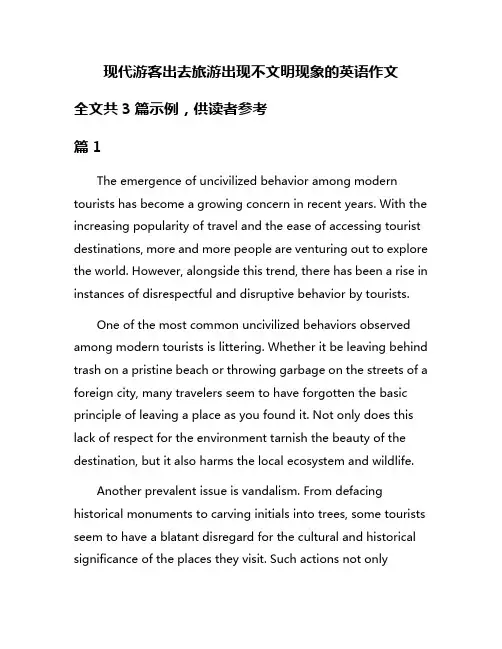
现代游客出去旅游出现不文明现象的英语作文全文共3篇示例,供读者参考篇1The emergence of uncivilized behavior among modern tourists has become a growing concern in recent years. With the increasing popularity of travel and the ease of accessing tourist destinations, more and more people are venturing out to explore the world. However, alongside this trend, there has been a rise in instances of disrespectful and disruptive behavior by tourists.One of the most common uncivilized behaviors observed among modern tourists is littering. Whether it be leaving behind trash on a pristine beach or throwing garbage on the streets of a foreign city, many travelers seem to have forgotten the basic principle of leaving a place as you found it. Not only does this lack of respect for the environment tarnish the beauty of the destination, but it also harms the local ecosystem and wildlife.Another prevalent issue is vandalism. From defacing historical monuments to carving initials into trees, some tourists seem to have a blatant disregard for the cultural and historical significance of the places they visit. Such actions not onlydisrespect the local heritage but also diminish the experience for future visitors.Additionally, disrespectful behavior towards locals is also a common occurrence. Whether it be haggling aggressively with street vendors or speaking loudly in places of worship, some travelers fail to show the courtesy and respect that should be extended to the residents of the destination they are visiting. Such behavior not only damages the reputation of tourists but also creates tensions between visitors and locals.Furthermore, the rise of social media has also fueled the trend of inappropriate behavior among tourists. Seeking the perfect photo for Instagram or Snapchat, some travelers have been known to trespass on private property, disturb wildlife, and put themselves in dangerous situations for the sake of capturing a memorable shot. This reckless pursuit of the perfect picture not only endangers the safety of the tourist but also sets a bad example for others.In order to address these issues, it is essential for both travelers and tourism authorities to take action. Education and awareness campaigns can help to inform tourists about the importance of responsible and respectful behavior while traveling. Implementing stricter regulations and penalties forthose who engage in uncivilized behavior can also serve as a deterrent.Ultimately, it is up to each individual traveler to uphold the values of respect, courtesy, and responsibility while exploring the world. By exhibiting civilized behavior and setting a positive example for others, modern tourists can contribute to a more sustainable and harmonious travel experience for all.篇2Modern tourists in today's world have been increasingly facing criticisms for their uncivilized behavior while traveling. The rise of tourism has brought about a myriad of negative impacts, such as overcrowding, environmental degradation, and cultural disrespect. This essay aims to explore some of the common uncivilized behaviors exhibited by modern tourists and the consequences they entail.One of the most prevalent uncivilized behaviors observed among modern tourists is littering. In popular tourist destinations, it is not uncommon to see trash scattered around, spoiling the natural beauty of the landscape. Tourists leave behind plastic bottles, food wrappers, and cigarette butts without a second thought, contributing to pollution and harmingthe local environment. This disrespectful behavior not only reflects poorly on the individual but also damages the reputation of the entire tourist community.Another disturbing trend is the lack of respect for local customs and cultural norms. Many tourists fail to educate themselves about the traditions and beliefs of the places they visit, leading to inadvertent acts of disrespect. For example, wearing inappropriate clothing at sacred sites, engaging in offensive behavior, or taking selfies without permission can all be seen as culturally insensitive and offensive. By disregarding the local culture, tourists risk perpetuating stereotypes and deepening cultural misunderstandings.Over-tourism is another pressing issue that arises from uncivilized tourist behavior. The unchecked influx of tourists to popular destinations has overwhelmed local infrastructure and resources, leading to overcrowding, congestion, and environmental degradation. Residents in tourist hotspots suffer from noise pollution, increased cost of living, and loss of community identity. The commodification of culture and heritage for the sake of tourism often results in the erasure of authentic local experiences and the homogenization of unique destinations.Furthermore, disrespectful behavior towards wildlife is a growing concern in the tourism industry. Tourists are often eager to interact with exotic animals, leading to exploitation, abuse, and endangerment of species. Activities such as wildlife selfies, elephant rides, and swimming with dolphins may seem harmless but have devastating consequences on animal welfare and conservation efforts. By prioritizing personal entertainment over ethical considerations, tourists contribute to the exploitation and suffering of innocent creatures.To address the issue of uncivilized tourist behavior, it is crucial for travelers to cultivate a sense of responsibility and respect towards the places they visit. Education and awareness are key in promoting sustainable tourism practices and fostering a culture of empathy and understanding. Tourists should strive to minimize their environmental footprint, support local communities, and engage in meaningful cultural exchanges that promote mutual respect and appreciation.In conclusion, the rise of modern tourism has brought about a range of uncivilized behaviors that threaten the sustainability and integrity of travel experiences. It is imperative for tourists to reflect on their actions and strive to be conscientious, respectful, and responsible travelers. By fostering a culture of empathy,understanding, and cooperation, we can ensure that tourism remains a force for good and a source of enrichment for both visitors and host communities.篇3Recently, with the growth of the global tourism industry, more and more people are traveling to different destinations for a variety of reasons. However, along with the increase in the number of travelers, there has also been a rise in the number of reports of uncivilized behavior by tourists. This phenomenon is particularly evident among modern tourists, as they often exhibit a lack of respect for the local culture, customs, and environment of the places they visit.One of the most common examples of uncivilized behavior by modern tourists is littering. Many tourists seem to have a careless attitude towards the environment when they are on vacation and often leave behind trash and garbage in public areas such as parks, beaches, and streets. This not only has a negative impact on the local environment but also reflects poorly on the image of the tourists and their home country.Another issue is the lack of respect for local customs and traditions. Some tourists behave inappropriately by disregardinglocal customs and traditions, such as dressing inappropriately at religious sites, using disrespectful language, or engaging in activities that are considered offensive or disrespectful by the local population. This not only shows a lack of cultural sensitivity but also risks causing misunderstandings and conflicts between tourists and the local community.Furthermore, the rise of social media and selfie culture has also contributed to the problem of uncivilized behavior among modern tourists. Many tourists are more concerned with capturing the perfect selfie or video for their social media accounts than they are with respecting the privacy and personal space of others. This can lead to intrusive behavior such as taking photos of strangers without their consent or disrupting the peace and quiet of a place to get the perfect shot.In addition, the excessive use of technology and digital devices by modern tourists can also be a source of uncivilized behavior. Some tourists become so engrossed in their smartphones or cameras that they fail to pay attention to their surroundings or the people around them. This can lead to accidents, such as bumping into others or causing disruptions in public spaces.To address these issues, it is important for both tourists and the tourism industry to promote responsible and respectful behavior among travelers. Tourists should make an effort to educate themselves about the local culture, customs, and environment of the places they visit, and try to be respectful and considerate towards the local population. The tourism industry can also play a role by providing information and guidelines to tourists on how to behave appropriately while traveling and by implementing measures to enforce respectful behavior.In conclusion, the rise of uncivilized behavior among modern tourists is a concerning trend that needs to be addressed. By promoting responsible and respectful behavior among travelers, we can ensure that tourism continues to be a positive and enriching experience for both tourists and the destinations they visit. It is important for all of us to remember that being a tourist is a privilege and it comes with a responsibility to respect and protect the places we visit.。
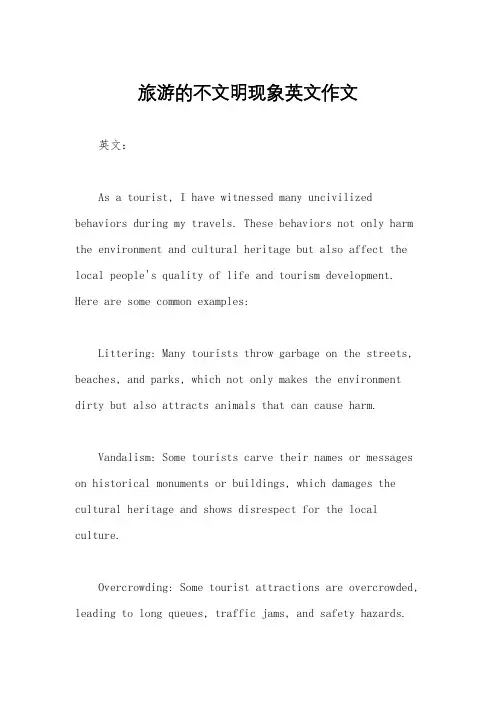
旅游的不文明现象英文作文英文:As a tourist, I have witnessed many uncivilized behaviors during my travels. These behaviors not only harm the environment and cultural heritage but also affect the local people's quality of life and tourism development. Here are some common examples:Littering: Many tourists throw garbage on the streets, beaches, and parks, which not only makes the environment dirty but also attracts animals that can cause harm.Vandalism: Some tourists carve their names or messages on historical monuments or buildings, which damages the cultural heritage and shows disrespect for the local culture.Overcrowding: Some tourist attractions are overcrowded, leading to long queues, traffic jams, and safety hazards.Tourists should respect the carrying capacity of the attractions and avoid overcrowding.Noise pollution: Some tourists play loud music or shout in public places, disturbing the peace and tranquility of the locals and other tourists.Unruly behavior: Some tourists behave rudely, such as cutting in line, pushing, or arguing with locals or other tourists, which creates a negative atmosphere and ruins the travel experience for everyone.To address these issues, tourists should be more responsible and respectful. They should follow the local rules and regulations, dispose of their garbage properly, avoid damaging the environment and cultural heritage, and behave politely and courteously. By doing so, tourism can be a sustainable and enjoyable experience for everyone.中文:作为一名旅游者,我在旅行中目睹了许多不文明的行为。

游客的不文明行为英语作文English Answer:Uncivilized behavior of tourists is a growing concern that impacts destinations around the world. It can manifest in a variety of forms, from littering and vandalism to disrespectful behavior and cultural insensitivity. The consequences of such actions can be far-reaching, damaging the environment, harming local communities, and tarnishing the reputation of tourist destinations.Littering is one of the most common forms ofuncivilized tourist behavior. Tourists who dispose of their trash improperly can pollute the environment, attract pests, and spoil the natural beauty of destinations. Vandalism, another prevalent problem, involves the deliberate damageor destruction of property. This can include graffiti, property damage, and even the theft of historical artifacts.Disrespectful behavior is also a major concern. Thisincludes behaviors such as loud talking, public intoxication, and inappropriate dress. Tourists who behave in a disrespectful manner can disrupt the peace and tranquility of local communities, making it difficult for residents to enjoy their surroundings. Culturalinsensitivity is another issue that can arise when tourists fail to respect local customs and traditions. This can include behaving in a manner that is considered offensive or disrespectful by the local population.The consequences of uncivilized tourist behavior can be severe. Environmental damage can have long-term impacts on ecosystems, while vandalism can destroy cultural heritage and historical sites. Disrespectful behavior can alienate local communities and make tourists unwelcome in certain destinations. Cultural insensitivity can lead to misunderstandings, conflict, and damage to relationships between tourists and local people.To address the issue of uncivilized tourist behavior, a multi-faceted approach is required. Education and awareness campaigns can play a role in informing tourists about theimportance of responsible behavior. Regulations and enforcement measures can also be effective in deterring littering, vandalism, and other offenses. Collaboration between tourism stakeholders, including tour operators, local authorities, and community groups, is essential to develop and implement effective solutions.Ultimately, the responsibility for preventing uncivilized tourist behavior lies with both tourists and the tourism industry. Tourists must be educated about the importance of respecting local cultures, traditions, and environments. The tourism industry must provide clear guidelines on acceptable behavior and work with local communities to ensure that tourists are welcomed and respected. By working together, we can create a more sustainable and enjoyable tourism experience for all.中文回答:旅游者的不文明行为是一个日益严重的问题,影响着世界各地的旅游目的地。

游客不文明英语作文Well, let's talk about something that really bugs me tourists who behave badly. You know, the ones who justdon't seem to care about the places they visit or the people around them.One thing that drives me crazy is when tourists litter everywhere. Like, come on, guys! There are trash cans all around. Why can't you just use them? It's not that hard. But no, they have to leave their wrappers and bottles all over the place, ruining the beauty of nature.And then there's the ones who just can't seem to respect the culture or traditions of the place they're visiting. They dress inappropriately, talk loudly, anddon't bother to learn even the basic greetings in the local language. It's like they're just there to take pictures and then move on.Oh, and let's not forget about the tourists who try totouch or feed the wild animals. I mean, really? Do youthink they want that? Just because you're fascinated by them doesn't mean you can mess with their lives.And finally, the ones who just don't seem to understand that they're not the only ones there. They push and shove their way through crowds, blocking everyone's view with their selfie sticks. It's like they're on a mission to ruin everyone else's day.So, yeah, that's my rant about tourists.。
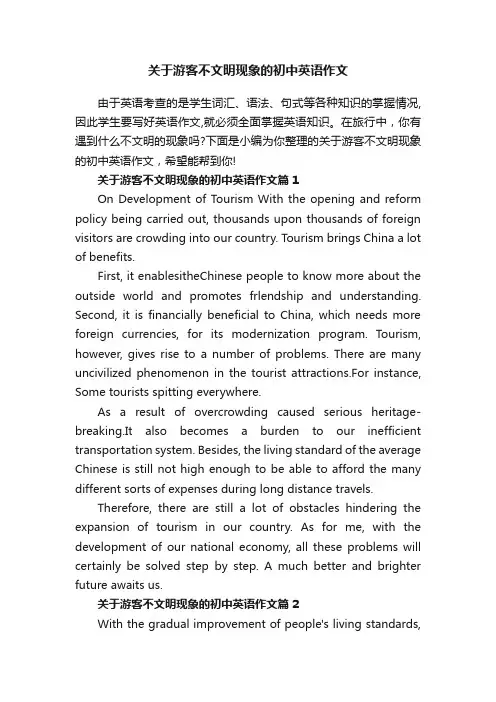
关于游客不文明现象的初中英语作文由于英语考查的是学生词汇、语法、句式等各种知识的掌握情况,因此学生要写好英语作文,就必须全面掌握英语知识。
在旅行中,你有遇到什么不文明的现象吗?下面是小编为你整理的关于游客不文明现象的初中英语作文,希望能帮到你!关于游客不文明现象的初中英语作文篇1On Development of Tourism With the opening and reform policy being carried out, thousands upon thousands of foreign visitors are crowding into our country. Tourism brings China a lot of benefits.First, it enablesitheChinese people to know more about the outside world and promotes frlendship and understanding. Second, it is financially beneficial to China, which needs more foreign currencies, for its modernization program. Tourism, however, gives rise to a number of problems. There are many uncivilized phenomenon in the tourist attractions.For instance, Some tourists spitting everywhere.As a result of overcrowding caused serious heritage-breaking.It also becomes a burden to our inefficient transportation system. Besides, the living standard of the average Chinese is still not high enough to be able to afford the many different sorts of expenses during long distance travels.Therefore, there are still a lot of obstacles hindering the expansion of tourism in our country. As for me, with the development of our national economy, all these problems will certainly be solved step by step. A much better and brighter future awaits us.关于游客不文明现象的初中英语作文篇2With the gradual improvement of people's living standards,more and more people choose to travel during the holidays. Many people choose the humanities history and scenic spots to travel.But with the increasing number of tourists, the uncivilized behavior of tourism isincreasing. Visitors free climbing, take pictures, in spots random graffiti, lettering, damage to vegetation, don't speak hygiene, waste discarded everywhere. Uncivilized phenomenon in tourism, is continuing to damage the image of Chinese tourists.I believe that the cultural tourism can focus on the following aspects: first, tourists should improve cultural quality, do civilized travel, don't do some damage to the culture, and timely reminder of the uncivilized behavior of others. Second, the tourist guide and the scenic spot management office should discourage the uncivilized behavior of tourists. Third, the media should increase the degree of exposure, so that people gradually realized the seriousness of theuncivilized travel. Finally, the government should implement some punitive measures according to the behavior of the passengers, improve the relevant laws and regulations. I believe that these problems will be solved step by step, and a beautiful tomorrow is waiting for us.关于游客不文明现象的初中英语作文篇3It have been discussed for a long time that how to deal with the uncivilized behaviors during the travel, such as write on the place of historic interests, or claim to old trees. This kind of things happened in China more often than any other countries. What can we do to prevent those actions? Though we have advocate education of the tourists for years, the situation was not better than be imagined. In my opinion, we still have to encourage theeducation of our tourists, but with some change. For example, we should not only disseminate “Don’t Do Sth.”, but also with the reason and an explanation that it is not cool to sign names or words everywhere, in the contrary, we have to ashamed of that. Make a comparison between foreigners and us can also increase our consciousness.。
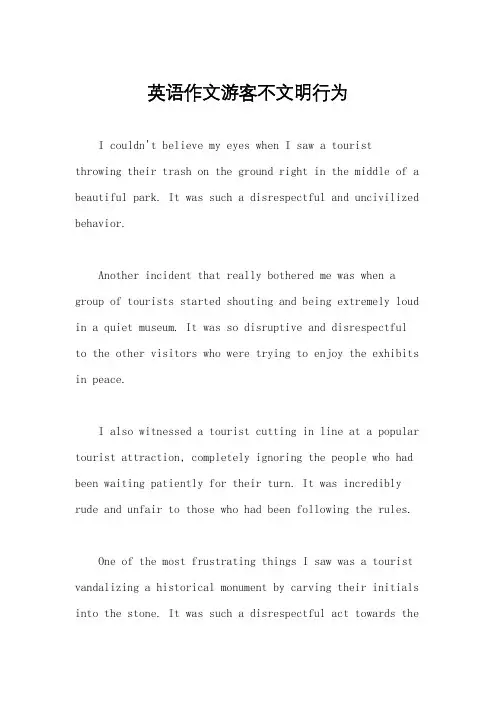
英语作文游客不文明行为I couldn't believe my eyes when I saw a tourist throwing their trash on the ground right in the middle of a beautiful park. It was such a disrespectful and uncivilized behavior.Another incident that really bothered me was when a group of tourists started shouting and being extremely loud in a quiet museum. It was so disruptive and disrespectful to the other visitors who were trying to enjoy the exhibits in peace.I also witnessed a tourist cutting in line at a popular tourist attraction, completely ignoring the people who had been waiting patiently for their turn. It was incredibly rude and unfair to those who had been following the rules.One of the most frustrating things I saw was a tourist vandalizing a historical monument by carving their initials into the stone. It was such a disrespectful act towards thecultural heritage of the place.It was also disappointing to see tourists taking photos of local people without asking for permission. It made the locals feel uncomfortable and violated, and it showed a lack of respect for their privacy.Overall, I was appalled by the lack of respect and consideration shown by some tourists. It's important for everyone to remember to be mindful and respectful when visiting new places, and to always treat the local people and their surroundings with care and consideration.。
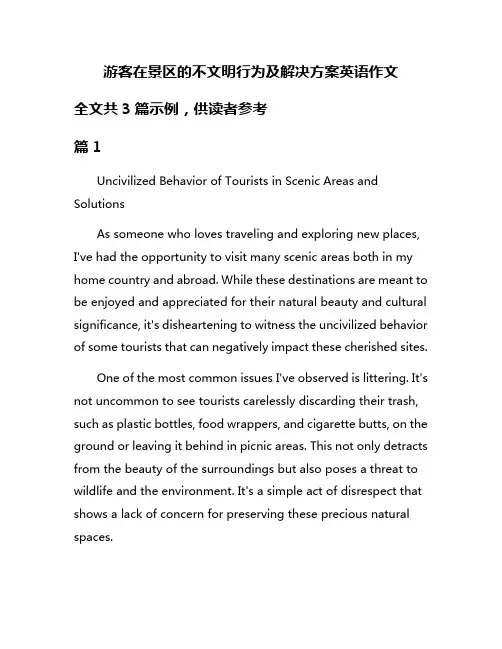
游客在景区的不文明行为及解决方案英语作文全文共3篇示例,供读者参考篇1Uncivilized Behavior of Tourists in Scenic Areas and SolutionsAs someone who loves traveling and exploring new places, I've had the opportunity to visit many scenic areas both in my home country and abroad. While these destinations are meant to be enjoyed and appreciated for their natural beauty and cultural significance, it's disheartening to witness the uncivilized behavior of some tourists that can negatively impact these cherished sites.One of the most common issues I've observed is littering. It's not uncommon to see tourists carelessly discarding their trash, such as plastic bottles, food wrappers, and cigarette butts, on the ground or leaving it behind in picnic areas. This not only detracts from the beauty of the surroundings but also poses a threat to wildlife and the environment. It's a simple act of disrespect that shows a lack of concern for preserving these precious natural spaces.Another concerning behavior is vandalism, which can take various forms. Some tourists feel compelled to leave their mark by carving initials or graffiti on trees, rocks, or even ancient structures. Others may intentionally or unintentionally damage fragile ecosystems by straying from designated paths or disturbing delicate plant life. These actions can have long-lasting and irreversible consequences, robbing future generations of the opportunity to experience these sites in their pristine condition.Moreover, disrespect for local customs and traditions is another issue that frequently arises. Certain tourists may exhibit culturally insensitive behavior, such as inappropriate dress or gestures, or disregard local norms and etiquette. This not only offends the local community but also reflects poorly on the tourism industry as a whole.To address these issues, a multifaceted approach involving education, enforcement, and infrastructure improvements is necessary.Firstly, education plays a crucial role in promoting responsible tourism. Awareness campaigns, guidebooks, and on-site signage can inform visitors about the importance of preserving natural and cultural heritage sites, as well as the potential consequences of their actions. Additionally, touroperators and guides should emphasize the need for respectful behavior and provide clear guidelines to their groups.Secondly, stricter enforcement of existing regulations and the implementation of new measures are essential. This could involve increasing the presence of park rangers or security personnel to monitor visitor behavior, imposing harsher penalties for violations, and implementing a system for reporting and addressing incidents promptly.Thirdly, infrastructure improvements can help mitigate some of the issues caused by overcrowding and lack of facilities. Providing adequate waste disposal systems, clearly marked trails, and designated picnic areas can encourage visitors to act more responsibly. Additionally, limiting the number of visitors or implementing t篇2Uncivilized Behavior of Tourists in Scenic Areas and SolutionsAs a student passionate about travel and the preservation of our natural and cultural heritage sites, I have witnessed firsthand the negative impact that uncivilized tourist behavior can have on these treasured locations. From littering and vandalism todisrespecting local customs and disregarding safety regulations, the actions of some tourists are not only detrimental to the environment and the sites themselves but also tarnish the reputation of responsible travelers.One of the most prevalent issues is littering. It is disheartening to see scenic areas marred by discarded plastic bottles, food wrappers, and other trash carelessly left behind by visitors. This not only detracts from the natural beauty of these places but also poses a threat to wildlife and ecosystems. Furthermore, the cost of cleaning up after irresponsible tourists falls on the shoulders of local communities and park authorities, diverting resources away from conservation efforts.Vandalism is another significant concern. Graffiti, carving initials into trees or ancient structures, and damaging historic artifacts are all forms of vandalism that irreparably harm these sites. Such actions not only show a blatant disregard for the cultural and historical significance of these locations but also deprive future generations of the opportunity to experience them in their original state.Moreover, some tourists fail to respect local customs and traditions, which can lead to cultural misunderstandings and offense. For instance, entering sacred sites without adhering todress codes or appropriate behavior can be seen as deeply disrespectful by local communities. Additionally, ignoring safety regulations, such as straying off designated paths or engaging in risky activities, puts not only the tourists themselves at risk but also burdens local authorities with the responsibility of rescue operations.To address these issues, a multi-faceted approach involving education, stricter enforcement, and collaboration between stakeholders is necessary.Firstly, educational campaigns aimed at raising awareness among tourists about responsible travel practices should be prioritized. This can be achieved through various channels, such as pre-trip information packets, on-site signage, and guided tours. By emphasizing the importance of preserving natural and cultural heritage sites, as well as the potential consequences of uncivilized behavior, tourists may be more inclined to adopt respectful and sustainable practices.Secondly, stricter enforcement of existing regulations and the implementation of new measures, where necessary, can serve as a deterrent against uncivilized behavior. This could include increased surveillance, higher fines for littering and vandalism, and the temporary or permanent banning of repeatoffenders from certain sites. Additionally, tour operators and accommodation providers should be held accountable for educating their clients about responsible tourism practices and enforcing codes of conduct.Thirdly, collaboration between local authorities, tourism businesses, and local communities is crucial in developing and implementing effective strategies to combat uncivilized tourist behavior. By working together, stakeholders can share knowledge, resources, and best practices, while also promoting a sense of shared responsibility for protecting these invaluable sites.Furthermore, incentives and recognition programs could be introduced to encourage and reward responsible tourism practices. For example, tour operators that prioritize sustainable and culturally sensitive experiences could be granted certifications or accreditations, which would appeal to conscientious travelers. Similarly, visitors who demonstrate exemplary behavior could be acknowledged and celebrated, fostering a culture of pride in being a responsible tourist.It is also essential to involve local communities in the decision-making process and empower them to play an active role in managing and preserving their own cultural and naturalheritage. By embracing their unique perspectives and traditional knowledge, more effective and culturally appropriate solutions can be developed.In addition to these measures, the tourism industry itself must embrace sustainability and responsible practices as core values. Tour operators, accommodation providers, and other businesses should prioritize eco-friendly initiatives, such as reducing waste, conserving water and energy, and supporting local economies. By leading by example and promoting responsible tourism as a brand value, these businesses can influence tourists to adopt more mindful behaviors.Ultimately, preserving the integrity of natural and cultural heritage sites is a shared responsibility that requires the collective effort of tourists, local communities, authorities, and the tourism industry. By fostering a culture of respect, education, and accountability, we can ensure that these invaluable sites remain pristine and accessible for generations to come.As a student and a passionate traveler, I believe that we all have a role to play in promoting responsible tourism practices. By embracing our collective responsibility and taking proactive steps to address uncivilized tourist behavior, we can contributeto the preservation of our world's natural and cultural treasures, while also enriching the experience for all visitors.篇3Uncivilized Tourist Behavior at Scenic Areas and Possible SolutionsAs a student who loves traveling and exploring new places, I have had the opportunity to visit many scenic areas both locally and internationally. However, during these trips, I have repeatedly witnessed uncivilized behavior exhibited by some tourists that not only detracts from the overall experience but also poses a threat to the preservation of these natural and cultural treasures. In this essay, I will discuss some of the most common forms of uncivilized tourist behavior and propose potential solutions to mitigate these issues.One of the most prevalent forms of uncivilized tourist behavior is littering. It is disheartening to see people carelessly discarding their trash, such as plastic bottles, food wrappers, and cigarette butts, in areas of outstanding natural beauty. Not only does this create an unsightly mess, but it also poses a severe threat to the local ecosystem and wildlife. Animals may mistakethese items for food or become entangled in them, leading to potential injury or death.Another concerning issue is the defacement of natural and cultural sites through graffiti, etching, or other forms of vandalism. These actions not only detract from the beauty and integrity of the site but also demonstrate a blatant disregard for the cultural and historical significance of these locations. It is crucial to remember that these sites are not personal canvases but rather shared treasures that should be respected and preserved for future generations.Disruptive behavior, such as excessive noise, disregard for designated pathways, and disrespect towards other visitors and local communities, is another form of uncivilized tourist conduct. This not only diminishes the overall experience for others but can also potentially damage fragile ecosystems and disturb the natural habitats of various species.Finally, overcrowding and overexploitation of popular tourist destinations can lead to significant environmental degradation. The influx of visitors beyond the carrying capacity of a site can result in soil erosion, pollution, and the depletion of natural resources, ultimately leading to the deterioration of the very attractions that draw tourists in the first place.To address these issues, a multifaceted approach involving various stakeholders is necessary. Firstly, education and awareness campaigns should be implemented to educate tourists about the importance of responsible and sustainable tourism practices. These campaigns can be conducted through various channels, such as visitor centers, informative signage, and social media platforms, emphasizing the importance of respecting and preserving natural and cultural heritage sites.Secondly, stricter enforcement of existing regulations and the implementation of new policies should be considered. This could include increased fines for littering, vandalism, and other forms of uncivilized behavior, as well as the temporary closure of heavily impacted sites to allow for ecological recovery. Additionally, limiting the number of visitors at certain times or implementing a permit system could help prevent overcrowding and overexploitation.Thirdly, collaborative efforts between local communities, tourism authorities, and conservation organizations are crucial. By working together, these stakeholders can develop and implement sustainable tourism strategies that balance the needs of visitors with the protection of natural and cultural resources. This could involve the establishment of designated walking paths,the provision of adequate waste management facilities, and the promotion of eco-friendly accommodation and transportation options.Furthermore, promoting and incentivizing eco-tourism initiatives can play a significant role in encouraging responsible tourism practices. Eco-tourism emphasizes minimal impact on the environment, respect for local cultures, and the provision of educational opportunities for visitors. By supporting businesses and organizations that prioritize sustainable tourism practices, we can create a positive feedback loop that rewards responsible behavior and discourages uncivilized conduct.Lastly, as individual tourists, we all have a responsibility to be mindful of our actions and their potential impact on the places we visit. By adhering to the principles of responsible tourism, such as respecting local customs and regulations, minimizing our environmental footprint, and supporting local economies, we can contribute to the preservation of these precious natural and cultural treasures for future generations.In conclusion, uncivilized tourist behavior at scenic areas is a significant issue that requires immediate attention and action. By implementing comprehensive education and awareness campaigns, enforcing stricter regulations, fostering collaborativeefforts among stakeholders, promoting eco-tourism initiatives, and encouraging personal responsibility, we can mitigate the negative impacts of irresponsible tourism practices. It is our collective duty to ensure that these natural and cultural wonders remain intact for generations to come, allowing future travelers to experience their beauty and significance firsthand.。
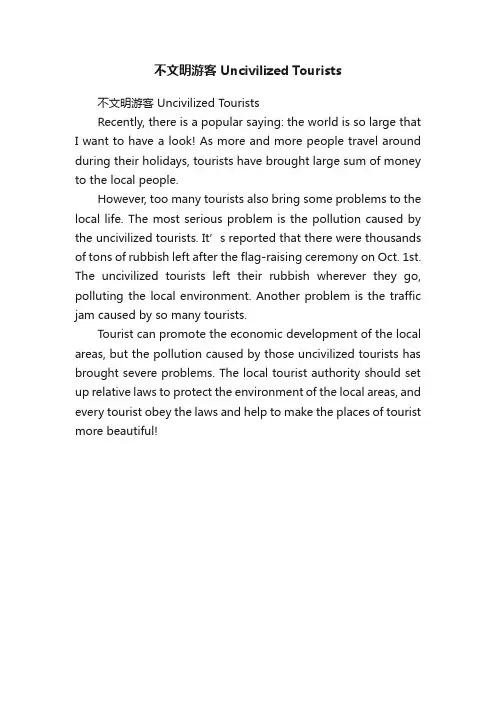
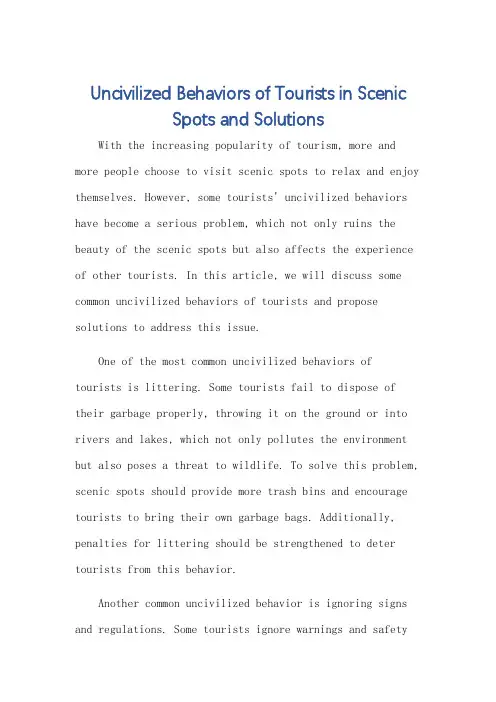
Uncivilized Behaviors of Tourists in ScenicSpots and SolutionsWith the increasing popularity of tourism, more and more people choose to visit scenic spots to relax and enjoy themselves. However, some tourists' uncivilized behaviors have become a serious problem, which not only ruins the beauty of the scenic spots but also affects the experience of other tourists. In this article, we will discuss some common uncivilized behaviors of tourists and propose solutions to address this issue.One of the most common uncivilized behaviors oftourists is littering. Some tourists fail to dispose of their garbage properly, throwing it on the ground or into rivers and lakes, which not only pollutes the environment but also poses a threat to wildlife. To solve this problem, scenic spots should provide more trash bins and encourage tourists to bring their own garbage bags. Additionally, penalties for littering should be strengthened to deter tourists from this behavior.Another common uncivilized behavior is ignoring signs and regulations. Some tourists ignore warnings and safetysigns, such as crossing dangerous areas or climbing prohibited mountains. These actions not only endanger their own safety but also pose a risk to rescue personnel who may need to intervene. To address this issue, scenic spots should improve signage and provide clearer warnings. Additionally, tourists should be educated about safety regulations and encouraged to follow them.A further uncivilized behavior is disturbing wildlife. Some tourists feed or approach wild animals, which can disturb their natural behavior and potentially lead to conflicts. To protect wildlife, scenic spots should provide educational materials and signage to inform tourists about the importance of respecting wildlife. Additionally, tourists should be discouraged from interacting with wild animals and be advised to keep a safe distance.Lastly, some tourists fail to respect local customs and cultures. They may dress inappropriately, speak loudly, or behave rudely in public places, which can offend local residents and破坏 the cultural atmosphere of the scenic spot. To avoid such conflicts, tourists should familiarize themselves with local customs and cultures before visitingand respect them while there. Scenic spots can also provide cultural guides or interpreters to help tourists understand and appreciate the local culture.In conclusion, uncivilized behaviors of tourists in scenic spots are a serious problem that needs to be addressed. By providing better facilities, enforcing regulations, educating tourists, and respecting local customs and cultures, we can create a more enjoyable and sustainable tourism environment for everyone.**游客景区不文明行为及解决方案**随着旅游业的日益繁荣,越来越多的人选择参观景区以放松身心。
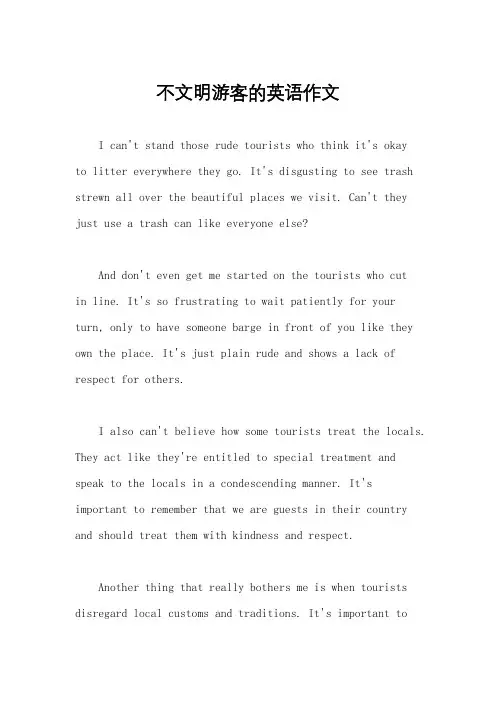
不文明游客的英语作文I can't stand those rude tourists who think it's okayto litter everywhere they go. It's disgusting to see trash strewn all over the beautiful places we visit. Can't they just use a trash can like everyone else?And don't even get me started on the tourists who cutin line. It's so frustrating to wait patiently for your turn, only to have someone barge in front of you like they own the place. It's just plain rude and shows a lack of respect for others.I also can't believe how some tourists treat the locals. They act like they're entitled to special treatment and speak to the locals in a condescending manner. It's important to remember that we are guests in their country and should treat them with kindness and respect.Another thing that really bothers me is when tourists disregard local customs and traditions. It's important toeducate yourself about the culture of the place you're visiting and show respect for their way of life. It's not okay to act like you're above their customs just because you're a tourist.And let's not forget about the tourists who take inappropriate photos or behave inappropriately in public places. It's important to remember that we are representing our own country when we travel, and we should behave in a way that reflects positively on where we come from.In conclusion, it's important to be a respectful and considerate tourist when visiting other places. We should always remember to clean up after ourselves, be patient and respectful towards others, and educate ourselves about the local customs and traditions. Let's strive to be better tourists and leave a positive impact wherever we go.。
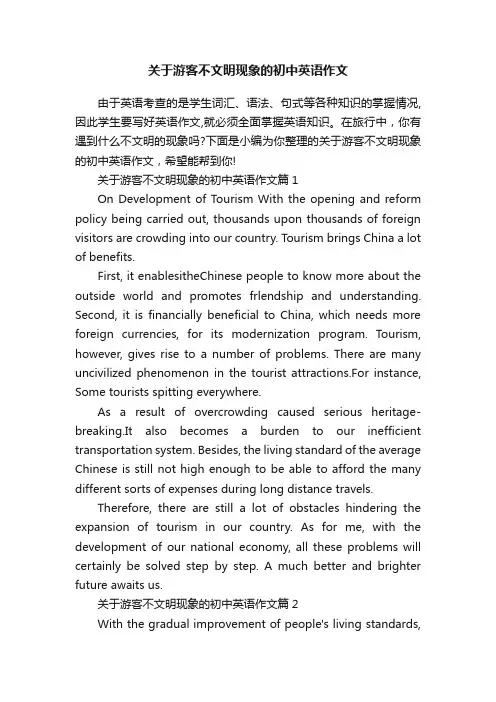
关于游客不文明现象的初中英语作文由于英语考查的是学生词汇、语法、句式等各种知识的掌握情况,因此学生要写好英语作文,就必须全面掌握英语知识。
在旅行中,你有遇到什么不文明的现象吗?下面是小编为你整理的关于游客不文明现象的初中英语作文,希望能帮到你!关于游客不文明现象的初中英语作文篇1On Development of Tourism With the opening and reform policy being carried out, thousands upon thousands of foreign visitors are crowding into our country. Tourism brings China a lot of benefits.First, it enablesitheChinese people to know more about the outside world and promotes frlendship and understanding. Second, it is financially beneficial to China, which needs more foreign currencies, for its modernization program. Tourism, however, gives rise to a number of problems. There are many uncivilized phenomenon in the tourist attractions.For instance, Some tourists spitting everywhere.As a result of overcrowding caused serious heritage-breaking.It also becomes a burden to our inefficient transportation system. Besides, the living standard of the average Chinese is still not high enough to be able to afford the many different sorts of expenses during long distance travels.Therefore, there are still a lot of obstacles hindering the expansion of tourism in our country. As for me, with the development of our national economy, all these problems will certainly be solved step by step. A much better and brighter future awaits us.关于游客不文明现象的初中英语作文篇2With the gradual improvement of people's living standards,more and more people choose to travel during the holidays. Many people choose the humanities history and scenic spots to travel.But with the increasing number of tourists, the uncivilized behavior of tourism isincreasing. Visitors free climbing, take pictures, in spots random graffiti, lettering, damage to vegetation, don't speak hygiene, waste discarded everywhere. Uncivilized phenomenon in tourism, is continuing to damage the image of Chinese tourists.I believe that the cultural tourism can focus on the following aspects: first, tourists should improve cultural quality, do civilized travel, don't do some damage to the culture, and timely reminder of the uncivilized behavior of others. Second, the tourist guide and the scenic spot management office should discourage the uncivilized behavior of tourists. Third, the media should increase the degree of exposure, so that people gradually realized the seriousness of theuncivilized travel. Finally, the government should implement some punitive measures according to the behavior of the passengers, improve the relevant laws and regulations. I believe that these problems will be solved step by step, and a beautiful tomorrow is waiting for us.关于游客不文明现象的初中英语作文篇3It have been discussed for a long time that how to deal with the uncivilized behaviors during the travel, such as write on the place of historic interests, or claim to old trees. This kind of things happened in China more often than any other countries. What can we do to prevent those actions? Though we have advocate education of the tourists for years, the situation was not better than be imagined. In my opinion, we still have to encourage theeducation of our tourists, but with some change. For example, we should not only disseminate “Don’t Do Sth.”, but also with the reason and an explanation that it is not cool to sign names or words everywhere, in the contrary, we have to ashamed of that. Make a comparison between foreigners and us can also increase our consciousness.。
出境旅游不文明的英语作文中国游客在海外旅游的不文明行为备受关注,其原由相信大家可以从下面的英语作文中能够看出。
下面是店铺给大家整理的出境旅游不文明的英语作文,供大家参阅!出境旅游不文明的英语作文1We need to behave politely because we represent China in foreigners' eyes.In order to prove to foreigners that China is a great nation with a high civilization, we should make sure we are polite. We should avoid speaking loudly in public places and spitting and littering.出境旅游不文明的英语作文2近来,中国游客在海外的不文明行为倍受热议。
假设你是李华,一名国际旅游社的导游,就此写一篇短文在一份英文报纸上发表自己的观点。
请根据下面的提示完成短文。
1 列举不文明行为2 指出其影响3 提出建议注意1 词数100左右2 可适当增加细节,以使行文连贯3 首句已给出,不计入总词数One possible versionAs a tour guide of an international travel agency, I find it so embarrassing to see many Chinese tourists behave badly abroad. They speak loudly in public places, carve characters on tourist attractions, throw rubbish, spit everywhere, and even cross the road when the traffic lights are still red. Such bad behavior overseas has caused damage to the country’s reputation.Measures should be taken to stop this. First, before going abroad, tourists should be trained to obey social and public order, and respect local religions and customs. Besides, kindergartens and primary schools should do more to teach the kids to be responsible citizens. Last, laws should be made to punish those who behave badly in public places. I hope soon tourists overseas will change their behavior and win respect for themselves and our country.出境旅游不文明的英语作文3中国人出国旅游的不文明行为越来越受到广泛关注。
旅游不文明行为英语作文【精选3篇】旅游不文明行为英语作文【精选3篇】三We cannot fail to notice that countless uncivilized behaviors exist in our daily lives, such as spitting, talking loudly, littering, saying nasty words in public places and so forth. All these are bad manners that we should not lose sight of. As an ancient land enjoying a splendid civilization spanning over 5,000 years, China is witnessing a surge in improper acts that every Chinese citizen should feel ashamed of. Uncivilized behaviors by a host of Chinese both at home and abroad have seriously affected Chinas image, according to an editorial posted on People Dailys official website.As Chinese, we should not get offended when others point out our weaknesses but should focus more attention on improving ourselves. We should strive to identify the causes of those improper behaviors and find ways to eliminate them. There are a host of causes, I would argue, behind this trend. To name only one: the lack of moral education. The government should wage a massive moral campaign to fight against this trend and we ourselves should endeavor to behave- 1 -。
英语作文游客不文明The Phenomenon of Uncivilized Tourists。
In recent years, with the rapid development of the tourism industry, more and more people choose to travel to various places for leisure and relaxation. However, along with the increasing number of tourists, the problem of uncivilized behavior among tourists has become more and more prominent. This phenomenon not only affects the image of the tourists themselves, but also has a negative impact on the local environment and the development of the tourism industry.First and foremost, the most common uncivilized behavior among tourists is littering. It is not uncommon to see tourists throwing trash on the ground, leaving behind a trail of garbage in the places they visit. This not only pollutes the environment, but also poses a threat to the health and safety of local residents and wildlife. In addition, some tourists also vandalize public property,such as carving their names on trees and historical relics, which damages the cultural heritage and historical sites of the local area.Moreover, some tourists show a lack of respect forlocal customs and traditions. They may ignore the rules and regulations of the places they visit, such as smoking in non-smoking areas, speaking loudly in quiet places, and dressing inappropriately at religious sites. This not only disrupts the local order, but also offends the local people and creates conflicts between tourists and locals.Furthermore, some tourists exhibit rude and impolite behavior towards service staff, such as shouting, swearing, and making unreasonable demands. This not only creates a negative atmosphere for other tourists, but also puts the service staff under great pressure and affects the quality of service.In response to this phenomenon, it is necessary for both the government and the public to take measures to address the problem of uncivilized behavior among tourists.Firstly, the government should strengthen the management and supervision of tourist attractions, and establish a sound legal system and regulatory mechanism to punish uncivilized behavior. For example, fines and penalties should be imposed on tourists who litter, vandalize public property, or violate local regulations. Secondly, the government should also launch public education campaigns to raise awareness of civilized behavior among tourists, and encourage them to respect local customs and protect the environment.At the same time, the public should also play an active role in promoting civilized behavior among tourists. Local residents and service staff should be patient and tolerant towards tourists, and provide guidance and assistance when necessary. In addition, the media and social organizations should also play a role in promoting civilized behavior among tourists, and create a positive atmosphere for tourism.In conclusion, the problem of uncivilized behavior among tourists is a serious issue that needs to beaddressed. It not only affects the image of tourists and the local environment, but also hinders the sustainable development of the tourism industry. Therefore, it is important for the government and the public to work together to promote civilized behavior among tourists and create a harmonious and pleasant tourism environment. Only in this way can we build a better future for tourism and promote the healthy and sustainable development of the tourism industry.。
游客不文明英语作文Tourists are often seen as the lifeblood of many local economies around the world. Their presence can bring much-needed revenue to hotels, restaurants, shops, and other businesses that cater to their needs. However, the influx of tourists can also lead to a range of problems, particularly when it comes to the behavior of some visitors. The issue of "uncivil behavior" among tourists has become a growing concern in many popular tourist destinations, with local residents and authorities struggling to address the challenges it poses.One of the most common forms of uncivil behavior exhibited by tourists is a lack of respect for the local culture and customs. Many visitors arrive in a new destination with a sense of entitlement, believing that the rules and norms that apply in their home country should also be followed elsewhere. This can lead to a range of issues, such as tourists disregarding dress codes in sacred or religious sites, engaging in loud or disruptive behavior in quiet or residential areas, or failing to properly dispose of their waste.This lack of cultural awareness and sensitivity can be particularlyproblematic in countries where the local population has a strong sense of tradition and community. In some cases, tourists may inadvertently offend or upset local residents simply by engaging in behavior that is considered acceptable in their own country but is viewed as disrespectful or inappropriate in the host culture. This can lead to tensions and conflicts between visitors and the local population, which can ultimately damage the reputation of the destination and discourage future tourism.Another issue that is often associated with uncivil tourist behavior is a disregard for the local environment. Many popular tourist destinations are located in fragile or sensitive ecosystems, such as beaches, forests, or mountains. When large numbers of tourists descend on these areas, the impact on the environment can be significant. This can include the trampling of vegetation, the pollution of waterways, and the disruption of wildlife habitats.In some cases, tourists may also engage in activities that directly harm the environment, such as littering, vandalism, or the removal of natural resources. This not only damages the local ecosystem but can also have long-term consequences for the sustainability of the destination as a whole. As more and more tourists visit these areas, the cumulative impact of their behavior can become increasingly difficult to manage, leading to a deterioration of the natural environment and a decline in the overall quality of the touristexperience.A third issue that is often associated with uncivil tourist behavior is a lack of respect for the local infrastructure and public spaces. In many popular tourist destinations, the local transportation system, public facilities, and other infrastructure may be strained by the influx of visitors. This can lead to overcrowding, long wait times, and other inconveniences for both tourists and local residents.In some cases, tourists may also engage in behavior that directly damages or disrupts the local infrastructure, such as vandalism, graffiti, or the theft of public property. This not only creates inconvenience and frustration for everyone involved, but it can also be costly for the local authorities to repair and maintain the affected areas.Overall, the issue of uncivil tourist behavior is a complex and multifaceted problem that requires a comprehensive and coordinated response from a range of stakeholders. Local authorities, tourism industry leaders, and community organizations all have a role to play in addressing this challenge and promoting more responsible and respectful tourism practices.One potential solution is to implement stronger regulations and enforcement measures to curb uncivil behavior among tourists. Thiscould include the imposition of fines or other penalties for those who engage in activities such as littering, vandalism, or disruptive behavior. It could also involve the implementation of educational campaigns and awareness-raising initiatives to help tourists understand the importance of respecting local customs and the environment.Another approach is to work more closely with the tourism industry to promote more sustainable and responsible tourism practices. This could involve the development of industry-wide codes of conduct, the provision of training and resources for tourism professionals, and the implementation of incentives and rewards for businesses that prioritize environmental and cultural preservation.At the same time, it is important to recognize that uncivil tourist behavior is not solely the responsibility of the visitors themselves. Local authorities and community organizations also have a role to play in creating an environment that is welcoming and supportive of responsible tourism. This could involve the provision of clear and accessible information for tourists, the development of well-designed public spaces and infrastructure, and the implementation of effective waste management and environmental protection measures.Ultimately, addressing the issue of uncivil tourist behavior willrequire a multifaceted and collaborative approach that involves a range of stakeholders working together to promote more sustainable and responsible tourism practices. By doing so, we can help to ensure that the benefits of tourism are enjoyed by both visitors and local communities alike, while minimizing the negative impacts that can arise from uncivil behavior.。
游客的不文明行为英语作文I was at the tourist spot the other day and I couldn't believe the lack of manners some people displayed. Trash was thrown everywhere, like the place was their personal garbage dump. It was disgusting to see such disregard for the environment.Some tourists were so loud and obnoxious, shouting and laughing as if they were the only ones there. It was impossible to enjoy the peaceful surroundings with all the noise they were making. It's like they had no respect for the other visitors who were trying to relax and enjoy the scenery.I also witnessed some tourists cutting in line at the ticket counter, pushing and shoving their way to the front as if their time was more valuable than everyone else's. It was rude and disrespectful to the other people who had been waiting patiently for their turn.One group of tourists even vandalized a historical monument by carving their names into the stone. It was heartbreaking to see such a beautiful piece of history defaced by their thoughtless actions. It made me wonder if they would do the same to their own homes.Overall, I was appalled by the behavior of some tourists at the site. It's important to remember that when we visit a place, we are guests in someone else's home. We should treat it with the same respect and courtesy that we would expect in our own homes. Let's all strive to be more mindful and considerate travelers in the future.。
中国游客旅游不正当行为英语作文全文共6篇示例,供读者参考篇1Oh hello everyone! Today I want to talk about something really important - the behavior of Chinese tourists when they travel. It’s super duper important to behave properly when we travel to other countries, right?But some Chinese tourists haven’t been very good at that. They sometimes do things that are not quite right when they go on vacation. This can make people in other countries feel upset or even angry. That’s not good at all, right?For example, some Chinese tourists have been caught cutting in lines, talking too loudly, or even vandalism at tourist sites. That’s really not cool! We should always be respectful to others and follow the rules when we are in a different country.We should remember to respect the local customs and traditions, and be mindful of our actions. We should also try to be good ambassadors for our country, and show the world the best side of China.So let’s all try to be on our best behavior when we travel, okay? Let’s make sure we leave a positive impression on the people we meet and show them how friendly and respectful Chinese tourists can be.Okay, that’s all for today. Remember, let’s be good tourists and make everyone proud! Bye-bye!篇2Title: Chinese Tourists Behaving inappropriately While TravelingHey guys, I want to talk about something serious today. It’s about Chinese tourists behaving badly while they are traveling. As a Chinese, I feel ashamed and embarrassed when I hear stories about my fellow countrymen misbehaving in other countries.First of all, let me tell you some examples of what some Chinese tourists have done. Some have been caught vandalizing historical sites, like carving their names into ancient monuments. Can you believe that? It’s s o disrespectful! Others have been seen spitting and littering in public places. That’s just plain gross!Not only that, some Chinese tourists also have a bad reputation for being loud and rude. They push and shove in lines, talk loudly in quiet places, and even ignore local customs and traditions. This is not how we should represent our country!We need to remember that when we travel to other countries, we are guests in their home. We should respect their culture, their rules, and their people. We should behave in a polite and considerate manner, just like we would want visitors to behave in our own country.So next time you travel, remember to be a good ambassador for China. Show the world the best of our country, not the worst. Let’s make our country proud! Thank you for listening.篇3Oh my gosh, have you heard about some Chinese tourists behaving badly while traveling? It's like they forget all their manners and act all crazy! Let me tell you all about it.First of all, some Chinese tourists don't respect the local customs and traditions of the places they visit. They go around talking loudly and causing a ruckus, not caring that they might be disturbing the people around them. They also don't follow the rules of the tourist attractions they visit, like touching thingsthey're not supposed to or taking pictures where they're not allowed. It's like they think they can do whatever they want just because they're on vacation!And then there's the issue of littering. Some Chinese tourists don't seem to care about keeping the places they visit clean and beautiful. They just throw their trash on the ground or leave it lying around, instead of finding a trash can to throw it away. It's so disrespectful to the environment and the people who live there!Another problem is when Chinese tourists haggle too much when shopping. They try to bargain for everything, even when it's not appropriate or the price is already fair. It can make the local vendors feel disrespected and annoyed, and it's just not a good look for Chinese tourists in general.Overall, Chinese tourists need to remember to be respectful and courteous when they travel. It's important to follow the rules, be mindful of the local customs, and clean up after ourselves. Let's all do our part to make sure we leave a positive impression wherever we go!篇4Title: Misbehaviors of Chinese TouristsHi everyone! Today, I want to talk about something important - the behavior of Chinese tourists when they travel. It is sad to say that some Chinese tourists have not been behaving very well when they go on vacation. They do things that are not good and it makes people upset.One of the things that Chinese tourists sometimes do is litter. They throw garbage on the ground instead of in the trash cans. This is not nice because it makes the place dirty and can harm the environment. We should always remember to keep our surroundings clean and throw our trash in the right place.Another thing that Chinese tourists do is cut in line. In China, it is not always easy to wait in line because there are so many people. But when we go abroad, we need to follow the rules and wait our turn. Cutting in line is not fair to the people who have been waiting patiently.Some Chinese tourists also talk loudly in public places. It is important to remember that when we are in a foreign country, we need to respect their customs and be quiet when we are in a public place. Talking loudly can disturb other people who are trying to enjoy their time.In conclusion, it is important for Chinese tourists to be respectful and good when they travel to other countries. Weshould always remember to be polite, follow the rules, and treat others with kindness. Let's all be good ambassadors for China and show the world how wonderful our country is. Thank you!篇5Hello everyone! Today I want to talk about the improper behavior of Chinese tourists when they travel to other countries.As a Chinese person, I feel sad when I hear about Chinese tourists behaving badly in other countries. Some people litter, spit, talk loudly, cut in line, and even vandalize historical sites. This is not respectful behavior and it gives all Chinese people a bad reputation.I think it is important for us to remember that when we travel to other countries, we are representing China. We should act in a way that makes our country proud. We should be respectful of the laws and customs of the country we are visiting. We should also be mindful of the environment and clean up after ourselves.It is also important to be patient and polite when we are traveling. It is not polite to push or cut in line. We should respect the people around us and treat them with kindness.In conclusion, I hope that all Chinese tourists will remember to be respectful and well-behaved when they travel to other countries. Let's show the world that Chinese people are polite, kind, and responsible travelers! Thank you for listening!篇6Title: Chinese Tourists' Improper Behavior During TravelHey everyone, today we are going to talk about Chinese tourists' improper behavior during travel. It's important to remember that when we travel, we are representing our country and culture. So, let's always try to be respectful and considerate to others.One of the most common issues is littering. Some Chinese tourists have a habit of throwing trash on the ground, even in famous tourist spots. This is not only disrespectful to the environment but also to the people who have to clean up after them. Remember, we should always dispose of our trash properly in trash cans.Another problem is cutting in line. It's not fair to others when we skip ahead of them in line. We should wait our turn like everyone else. Let's remember to be patient and respectful to our fellow travelers.In addition, some Chinese tourists can be loud and rude in public places. It's important to be mindful of our volume and language when we are in public spaces. Let's try to be polite and considerate to those around us.Lastly, some Chinese tourists have been known to damage property at tourist sites. It's important to remember that these sites are valuable cultural treasures that should be respected and preserved for future generations. Let's always treat these places with care and respect.In conclusion, as Chinese tourists, we should strive to be good ambassadors for our country when we travel. Let's always be respectful, polite, and considerate to others. By doing so, we can help promote a positive image of Chinese tourists around the world. Thank you for listening!。
高一下学期第一周作文:
书面表达(满分25分)
近来,中国游客在海外的不文明行为倍受争议。
假设你是李华,一名国际旅行社的导游,就此写一篇短文在一份英文报纸上发表自己的观点。
请根据下面的提示完成作文。
1、列举不文明行为:
2、指出其影响:
3、提出建议。
【1、列举不文明行为:2、指出其影响:】3、提出建议。
注意:1、词数100左右;
2、可适当增加细节,以使行文连贯;
3、首句已给出,不计入总词数。
As a tour guide of an international travel agency,I find it so embarrassing to see many Chinese tourists behave badly abroad.
_____________________________________________________________________ _______
参考范文
One Possible Version:
按要求写作版:
As a tour guide导游of an international travel agency, I find it so embarrassing 令人尴尬的to see many Chinese tourists behave badly abroad.
They speak loudly 大声说话in public places, carve characters on tourist attractions,游客景点上刻字throw rubbish扔垃圾, spit everywhere随处吐痰, and even cross the road ignoring the traffic lights. 闯红灯Such bad behaviors overseas have caused great damage to造成伤害the image形象of the Chinese people and our country as well.
Measures should be taken to stop this. 措施应该被采取以阻止这事。
First, before going abroad, tourists should be trained 被训练to obey social and public order公共秩序, and respect local religions and customs.当地宗教和习俗。
Besides, it is a good idea to teach kids to be responsible负责任的citizens from kindergarten days. Last, laws should be made to punish 惩罚those 【who behave badly in public places. 】I hope soon tourists overseas will change their behavior and win respect for themselves and our country.
润色版:
As a tour guide导游of an international travel agency, I find it so embarrassing 令人尴尬的to see many Chinese tourists behave badly abroad.
【那些不文明的行为是如此的普遍以致中国人都以此为耻。
不文明的例子比比皆是。
Those bad behaviors are so common that most Chinese feel ashamed of them. Examples of improper behaviors are not far to seek.】They speak loudly 大声说话in public places, carve characters on tourist attractions,游客景点上刻字throw rubbish扔垃圾, spit everywhere随处吐痰, and even cross the road ignoring the traffic lights. 闯红灯[毫无疑问No one can deny that Such bad behaviors overseas have caused great damage to造成伤害the image形象of the Chinese people and our country as well. [ It is high time that we should stop them.]
Measures should be taken to stop this. 措施应该被采取以阻止这事。
First,
before going abroad, tourists should be trained被训练to obey social and public order公共秩序, and respect local religions and customs.当地宗教和习俗。
Besides, it is a good idea to teach kids to be responsible负责任的citizens from kindergarten days. Last, laws should be made to punish 惩罚those 【who behave badly in public places. 】
【To sum up, 总而言之,so long as the tourists overseas do behave well , they can definitely win respect for themselves and China. 只要国外游客可以规范自己的行为,他们绝对能为自己和中国赢得尊重。
】。